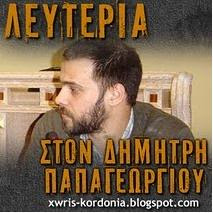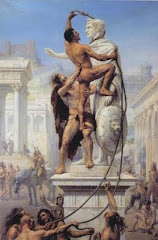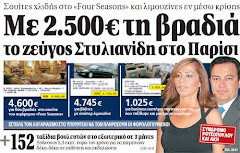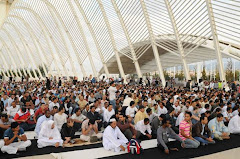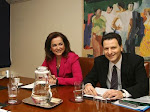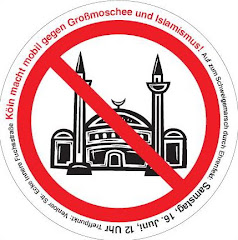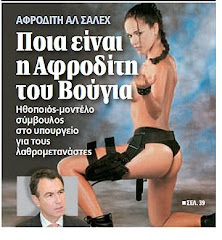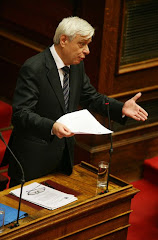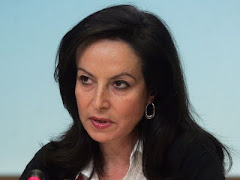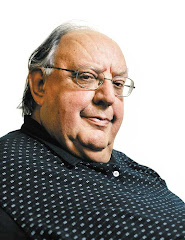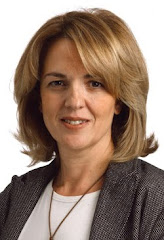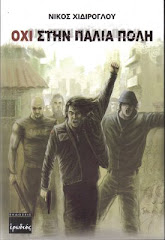
Ο Uffe Ellemann-Jensen είναι πρώην υπουργός εξωτερικών της Δανίας και ένας από τους ιδρυτές μίας διεθνούς δεξαμενής σκέψης με τίτλο «Project Syndicate»,η οποία έχει σαν σκοπό την προώθηση των Αμερικανικών συμφερόντων στον κόσμο, με εμφανή φιλικό προσανατολισμό προς την Τουρκία, τα Σκόπια κι το Ισραήλ.
Σε άρθρο του με τίτλο «NATO´S DANGEROUS SIGNALS»,( http://www.project-syndicate.org/commentary/ellemanjensen15), ο κ. Ellemann, επιτίθεται εναντίων της χώρας μας σε ένα πρωτοφανές ανθελληνικό άρθρο αναφορικά με το βέτο της Ελλάδος στο Βουκουρέστι που αφορούσε την ένταξη των Σκοπίων στο ΝΑΤΟ. Σε αυτό εκτός άλλων διατυπώνεται και η σκέψη, ότι οι εταίροι της Ελλάδος θα πρέπει να συνετίσουν την Ελλάδα με κάποιο «πιστικό τρόπο».
Το άρθρο έχει ως εξής:
COPENHAGEN – Two dangerous signals were sent from NATO’s Bucharest summit. The first was that Russia has reestablished a “sphere of interest” in Europe, where countries are no longer allowed to pursue their own goals without Moscow accepting them. The other was that all NATO member states are free to blackmail their partners into supporting their own narrow goals.
The first signal was sent when Ukraine and Georgia were denied the “Membership Action Plan” (MAP) that they sought. Several European heavyweights, led by Germany and France, said no, despite strong support for the idea from the United States.
The second signal was sent when Greece successfully vetoed membership for Macedonia, a move that reflected the two countries’ unresolved conflict over Macedonia’s name (which Greece insists must be Former Yugoslav Republic Of Macedonia – FYROM – one of the most disgraceful acronyms harassing international politics today).
The dispute with Macedonia goes back to the early 1990’s, when Yugoslavia collapsed into independent states. Greece vehemently opposed its tiny northern neighbor – with only two million inhabitants – using the name Macedonia and symbols from the days of Alexander the Great in its flag and crest. Macedonia at one point agreed to design a new flag and remove the symbols, as well as to amend its constitution to clarify that it had no territorial claims on Greece, but it flatly refused to live under one of the tongue-twisting names suggested by its bigger neighbor.
So there you are: a Greek veto on Macedonia’s national aspirations until it has chosen a name that does not make the Greeks shiver in fear of aggression from the north. It sounds ridiculous, but there is another, often overlooked, aspect to the dispute: by behaving as it has, Greece is demonstrating a lack of confidence in its NATO partners. With Macedonia in NATO, any adventurous policy that undermined regional stability would certainly be stopped in its tracks. If the Greeks cannot see that, their partners must let them know that there is a price for their obstructive behavior.
The problem with Ukraine and Georgia is far more serious. In a sense, Russia has behaved like Greece in claiming that NATO enlargement threatens its security. That is nonsense, and Russia knows it. But the Kremlin has found that behaving like a spoiled child gets results: the right to influence developments in ex-Soviet countries. In other words, Russia is being allowed to re-assert its “sphere of influence” – a concept that should have been superceded by that of “Europe Whole and Free,” which the entire European Union appeared to have embraced when communism collapsed. But no: 1989 was not the end of history. History threatens to return.
European opponents of a MAP for Ukraine and Georgia argue that neither country is ready for NATO membership. Too many question marks about their national unity are said to exist, too many internal conflicts linger, and their records on political and judicial reforms are supposedly dubious.
But the MAP process does not imply an automatic right to NATO membership. On the contrary, MAPs would put heavy demands on Ukraine and Georgia. Both would have to answer a lot of difficult questions and convince others that they are able to live up to NATO’s democratic requirements before being allowed to join.
Therefore, it would also be in Russia’s interest to see such a process started. Russia has valid concerns regarding the huge Russian-speaking minorities in both countries, and these concerns are best dealt within the framework of the MAP process, where the Organization for Security and Cooperation in Europe’s very strict rules on treatment of minorities provide the benchmark. Indeed, the MAP process ensured protections for Russian minorities in Estonia, Latvia, and Lithuania – all ex-Soviet republics that are now NATO members.
The crux of the matter is Europe’s lack of political will to forge a unified stand toward Russia. This has led Russia to pursue a classic “divide and rule” strategy by tempting some big European countries into bilateral agreements – particularly on energy issues – that preclude a common EU position.
This is sad – both for Russia and Europeans – because it strengthens the hand of those in Moscow who want to pursue a policy of national pride rather than national interest, and it weakens the possibilities of establishing a real common European foreign and security policy.
But it is saddest for the countries that are once again being left out in the cold. NATO is supposed to be a beacon for countries struggling to establish democracy and freedom. The Bucharest summit suggests that the beacon has been switched off.

